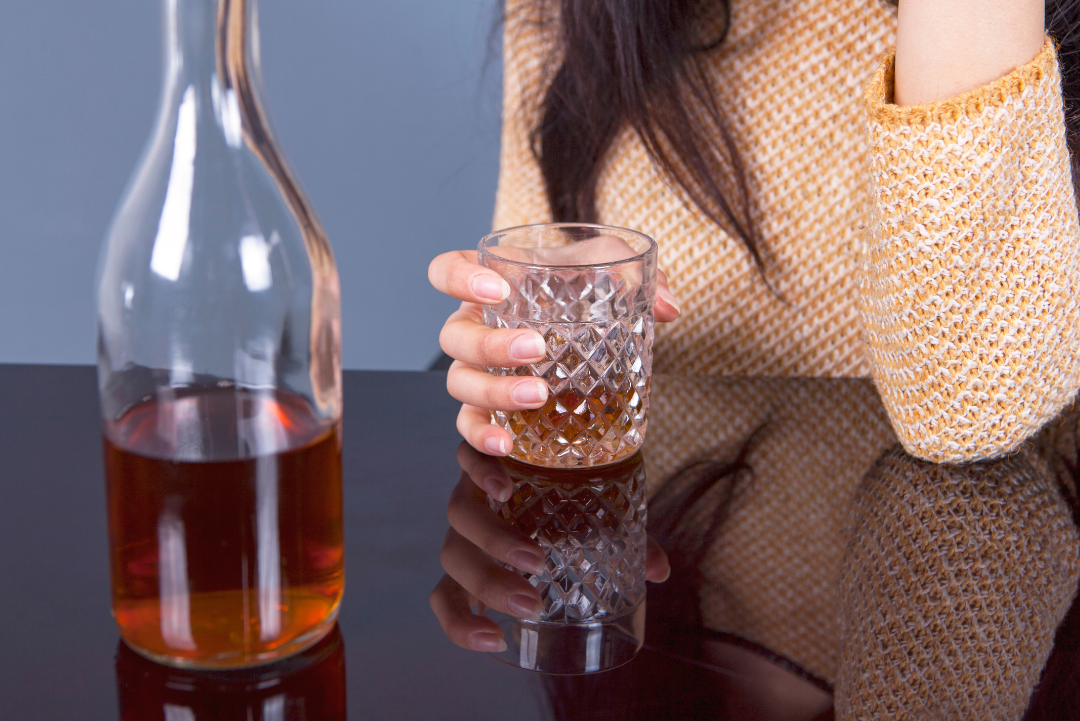Blog
Why So Many Women Are Stuck in “Middle Gear” - And Why That Leads to Drinking at the End of the Day
There’s an idea often shared by neuroscientist Tommy Wood that explains why so many women feel permanently exhausted - yet struggle to truly rest.
He talks about humans having different “gears,” not just physically, but neurologically and emotionally. Many women, in particular, spend much of their lives in what he describes as “middle gear” - a state of constant alertness, responsibility, mental load, and task switching.
The Conversation We Need to Have About Alcohol and Dementia
Dementia is one of those words that can stop a conversation. It feels heavy and confronting, and for many people it is something they would rather not think about but avoiding the topic does not protect us. Understanding it might.
In Australia, dementia has been the leading cause of death for women since 2016. In 2024, 62.4 per cent of people who died from dementia were women. These are not distant or abstract numbers, they tell us this is a real and growing issue, and one that deserves more open conversation.
We need to start talking about dementia, not in a way that creates fear, but in a way that builds awareness. We already accept the idea of reducing our risk of heart disease or cancer through lifestyle choices. Brain health deserves the same level of attention.
What Really Changes in Your Relationships When You Go Alcohol-Free
When women think about changing their relationship with alcohol, they often focus on the drinking, BUT, what usually brings the most uncertainty - and sometimes fear - is this question:
What will happen to my relationships if I stop drinking?
Romantic partnerships.
Friendships.
Parenting.
Even the relationship you have with yourself.
The truth is, going alcohol-free doesn’t ruin relationships - but it does change the dynamics. And while that can feel uncomfortable at first, that’s also where the real growth happens.
How Women Actually Age Well: The Four Health Pillars That Truly Work
Ageing well isn’t about trying harder, being stricter, or chasing the latest wellness trend.
For women, ageing well is about supporting the systems that regulate energy, mood, hormones, and stress — especially as life becomes more demanding and hormones become less predictable.
After years of working with women, one thing is clear:
The women who age well don’t do everything.
They focus on four non-negotiable health pillars:
Nutrition. Sleep. Movement. Stress management.
When these pillars are supported, everything else becomes easier — including changing your relationship with alcohol.
The 3 Ms of Alcohol Use: Magic, Medicine & Misery. (And What They Mean for Women)
For many women, alcohol doesn’t start as a problem. It starts as something that works.
It helps you relax.
It helps you feel more confident.
It helps you take the edge off a busy, demanding life.
That’s why conversations about drinking can feel so confusing — and so personal. Alcohol often plays different roles at different stages of our lives.
One of the most helpful ways to understand your relationship with alcohol is through what is known as The 3 Ms of Alcohol Use:
Magic. Medicine. Misery.
Most women move through all three at some point — often without realising it.
A New Year Without the All-or-Nothing Pressure
New Year has a way of quietly turning up the volume on our inner dialogue, especially around the things we have been meaning to look at for a while. Suddenly it feels like we should have answers, plans and clear intentions, even if we are not quite ready to make them yet.
For many women, alcohol sits right in the middle of that space.
5 Signs You Are Ready for a Break From Booze
I remember back in 2017 when I took my first break from booze everyone asking me ‘what was the red flag moment Sarah? What was your rock bottom?’ But the truth is, there wasn’t one big major moment. Instead, there were several little warning signs that I couldn’t ignore any longer. A slow gradual realisation that I couldn’t keep ignoring.
It was the acknowledgement of these 5 signs that led to my first break, which ultimately led to me changing my life in ways that I could never have imagined possible. None of this was about saying ‘I have a huge problem with alcohol.’ All of it was about saying ‘it might now be working for me anymore.’
Below are the 5 signs. If you find yourself nodding along, I want you to know: there’s absolutely nothing wrong with you. I’ve supported over 10,000 women so far to change their drinking who all resonated with these signs. And I want you to know change is 100% possible.
Why January Is the Most Powerful Month to Reset Your Drinking — Backed by Neuroscience
If you’ve been toying with the idea of taking a break from alcohol, there is no month more powerful than January. Not because of “new year, new you” pressure, but because your brain and body are scientifically primed for change in January in ways they aren’t at any other time of year.
This is the month when your dopamine pathways are most responsive, your cortisol rhythm is begging for regulation, and — after the emotional chaos of December — your motivational circuits finally have space to breathe.
Here’s the science-meets-real-life rundown of why a January alcohol reset works so well, and why my 30-Day Alcohol-Free Challenge uses this month to deeply assess and rebalance your neurotransmitters.
My Second Booze Free Christmas And Yes I’m Still Having Fun!
December is here and I am rolling into my second alcohol free Christmas in a row. I have done alcohol free Christmases in the past, but never back to back. This year hits differently. Today I am 700 days alcohol free and honestly, it still surprises me how good life feels without the thing I once thought I could not live without.
For most of my adult life I started every new year feeling fragile, tired and already behind. I would spend December promising myself I would “just have one” or “only drink on the weekends” or whatever creative rule I was clinging to at the time. None of it worked. I would wake up feeling poisoned and wonder why I felt… poisoned.
The Christmas I Knew My Drinking Had to Stop
There are Christmases you forget, and then there are the ones that split your life into before and after. For me, it was the year the festive season became less about magic and more about survival - and the year I finally realised something had to change.
When “Mummy Wine Culture” Stopped Being Fun
It started with a thud — literally.
A friend’s 40th, too many refills, a cigarette outside, and a fall that ended with blood on the pavement and bruises across my face.
The next morning, my five-year-old daughter looked at me with wide eyes and asked, “Mummy, what happened to your face?”
That question stopped me in my tracks.
For years, I’d brushed off my drinking as “normal.” I wasn’t drinking in the mornings or hiding bottles, so surely I didn’t have a problem.
But that day was my wake-up call — a moment of shame that peeled back the truth about my relationship with alcohol and forced me to confront what so many women experience in silence.
I Was a Grey Area Drinker for 29 Years. I Quit Drinking 6 Years Ago. Here’s What Changed
I thought a life without booze would be boring.
I thought I’d never have fun again.
For nearly three decades, my entire identity was wrapped up in being Sarah the Party Girl.
The one who was always up for a glass (or three). The one who could out-socialise anyone.
I didn’t know who I was outside of that.
But here’s the truth — at 6.6 years alcohol-free, my life is bigger, brighter, calmer, and happier than I ever imagined.
Gen Z Wants a Different Kind of Christmas Party This Year: How to Make Yours More Alcohol-Free (and Actually Fun)
Once upon a time, the office Christmas party was synonymous with free-flowing wine, tipsy dancing, and questionable karaoke. But the next generation of workers is quietly rewriting that story.
A Harris Poll cited by Axios found that 42 % of Gen Z employees would prefer little to no alcohol at their workplace party — compared to 37 % of all workers. Add to that a post-#MeToo awareness of boundaries and a growing focus on wellbeing, and it’s clear: the “boozy bash” is losing its appeal.
Women Deserve to Know the Truth About Alcohol
I shook my head in complete astonishment as my guest speaker shared fact after fact about women and alcohol.
Despite having been alcohol-free for over five years — and deeply immersed in the sober living space — I was still taken aback by the statistics, research, and insights I had never encountered before.
As we wrapped up the interview, I looked at Ann Dowsett-Johnson — author, medical journalist, and speaker — and asked:
“But why don’t women know all of this?
How can we live in a world that isn’t shouting this from the rooftops, but instead promotes alcohol as the answer to all our problems?
Don’t women deserve the truth?”
That moment stopped me in my tracks. Because she’s right — women deserve to know.
6 Years Sober: What I Know for Sure
Six years.
Sometimes I still can’t quite believe it.
What I know for sure is that quitting alcohol is a journey like no other. It takes you to the depths of who you really are — the good, the bad, and yes, the slightly messy bits too.
Over time, your world doesn’t shrink without alcohol — it expands. Time feels different. Days feel longer, richer, fuller. You notice the small things, the real moments. Getting sober is the ultimate life reset.
Six years on, I am so damn proud of how far I’ve come.
Thriving Beyond the First 30 Days: What Really Happens After the Alcohol Free Challenge Ends
You have just finished your 30 day alcohol free challenge. You might feel proud, clear, and maybe even a little amazed at how much can change in a month. The sleep. The energy. The mornings that actually feel like mornings again.
Or maybe, you are not feeling that just yet. You have made progress, but something still feels unsettled. The cravings have eased, but the emotions have crept in. You thought you would feel lighter, but instead you are tired, flat, or wondering, what now?
Alcohol in the Workplace: The Hidden Culture We Don’t Talk About
In many professional workplaces, alcohol has long been part of the culture. Friday night drinks, client dinners, networking events, and team celebrations - all built around the idea that sharing a drink helps us bond, relax, and belong.
For decades, this has gone unquestioned. But quietly, that’s beginning to change.
More professionals are starting to ask:
Why do we need alcohol to connect?
What happens to our performance when we drink regularly?
And how can we create workplaces that genuinely support wellbeing - not just pay lip service to it?
How Do We ACTUALLY Stop Sugar Cravings?
You spend the day doing everything right — protein for breakfast, good hydration, a decent, balanced lunch — and then by 3pm, you’re tearing down the pantry to get to the kids’ chocolate muesli bars (or anything sugary you can get your hands on). Sound familiar?
Whether you’re sober, trying to cut back on alcohol, or just aiming for better health, sugar cravings can feel relentless. They don’t just appear out of nowhere — they’re often driven by a combination of physiological, emotional, and habit-based triggers. The good news? Understanding what’s really going on gives you a roadmap to finally beat them.
The 5 Protocols for More Energy and Weight Loss After 40
Turning 40 is a milestone in many ways — career, family, confidence — but it also comes with some unwelcome changes to our metabolism, hormones, and energy. Suddenly, what worked for weight loss in your 20s and 30s doesn’t anymore. And that stubborn belly fat? It feels like it’s got a life of its own.
The good news: it’s not about eating less and exercising more. It’s about working with your body, not against it. Here are five practical protocols that help women over 40 feel more energetic, get their metabolism moving, and finally shift that stubborn weight.
The Small Shifts That Made a Big Difference for a Successful Sober October
With “Sober” October starting, I wanted to share a few things that really helped me in the early days. These are the small shifts that made the biggest difference for me, especially when I still didn’t feel 100% sure I could do it.
Because I absolutely didn’t feel “ready” when I started either.
I was tired, overwhelmed, and quietly wondering if maybe alcohol was playing a bigger role in my life than I wanted it to. But I still hesitated. I waited for a time when things would be quieter, calmer, less chaotic.
That time never came.
Eventually, I just said yes. I gave it a go and that’s when everything started to shift.




















